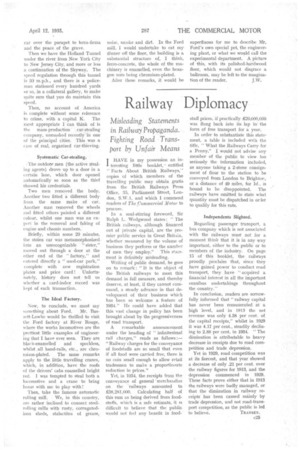Railway Diplomacy
Page 47

If you've noticed an error in this article please click here to report it so we can fix it.
Misleading Statements
• in, Railway.Propaganda.. Fighting Road -Transport by Unfair Means
HAVE in my possession an interesting little booklet,.' entitled " Facts About British Railways," copies of which members of the travelling public may obtain gratis Irma the British Railways Press Office, 35, Parliament Street, London, S.W.1, and which I commend readers of The pommercial Motor to procure.
In a soul-stirring foreword, Sir Ralph L. -Wedgwood states: "The British railways, although financed out of private capital, are the premier public service in Great Britain, whether measured by the volume of business they perform or the number of men they employ." This state-. ment is definitely misleading.
Writing of public demand, he goes on to remark "It is the object of the British railways to meet this demand in full measure, and thereby deserve, at least, if they cannot command, a steady adVance in that development of their business which has been so welcome a feature of 1934." He could have added that this vast change in policy has been brought about by the progressiveness of road transport.
A remarkable announcement under the heading of " infinitesimal rail charges," reads as follows "Railway charges for the conveyance of foodstuffs are so small that even if all food were carried free, there is no coin small enough to allow retail tradesmen to make a proportionate reduction in prices."
Yet, in 1034, the receipts from the conveyance of general 'merchandise on the railWays animinted to ;C38,281,000. Calculating half of this sum as being derived from foodstuffs, which is a safe estimate, it is difficult to believe that the public would not feel any benefit in food. . stuff prices, if practically £20,000,000 was flung back into its lap in the form of free transport for a year.
In order to substantiate this statement, a table is included with the title, "What the Railways Carry for a Penny." I Would not advise any member of the public to view too seriously the information included, as anyone taking a 2-stone consignment of flour to the station to be conveyed from London to Brighton, or a distance of 49 miles, for id., is bound to be disappointed. The railways have omitted to state what quantity must be dispatched in order to qualify for this Tate.
Independents Slighted.
Regarding passenger transport, a bus company which is not associated with the railways must not for a moment think that it is in any -way important, either to the public or to members of the industry. On page 15 of this booklet, the• railways proudly proclaim that, since they have gained power to conduct road transport, they have "acquired a financial interest in all the important omnibus undertakings throughout the country."
In conclusion, readers are sorrowfully informed that "railway capital has never been remunerated at a high level, and in 1913 the net revenue was only 4.38 per cent, of the capital receipts," whilst in 1929 it was 4.17 per cent., steadily declining to 2.88 per cent. in 1934. "The diminution is attributable to heavy decrease in receipts due to road competition and trade depression.
Yet in 1929, road competition was at its fiercest, and that year showed a decrease of only .21 per cent. over the railway figures for 1913, and the depression commenced in 1929. These facts prove either that in 1913 the railways were badly managed, or that the diminution in railway receipts has been caused mainly by trade depression, and not road-transport competition, as the public is led to believe. TRANSEX.












































































































